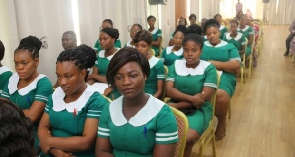The United Kingdom has ranked Ghana among the list of 54 countries that should not be actively targeted for recruitment by health and social care employers. The announcement was made by the UK government in its revised code of practice for the international recruitment of health and social care personnel in England.
The code states that some developing countries such as Ghana, Cote d’Ivoire and Nigeria should not be targeted when actively recruiting health or care professionals.
In a release on the NHS website, the UK government explained that the listed countries have a UHC Service Coverage Index that is lower than 50 and a density of doctors, nurses and midwives that is below the global median (48.6 per 10,000 population).
The UK government added that the list was based upon the World Health Organisation (WHO) Workforce Support and Safeguard List, 2023, and will be updated alongside progress reports on WHO Global Code implementation and reported to the World Health Assembly every three years.
It was, however, stated that the list doesn’t prevent individual health and social care personnel from independently applying to health and social care employers for employment in the UK, of their own accord and without being targeted by a third party, such as a recruitment agency or employer (known as a direct application).
This does not come as a surprise to The Chronicle since a lot of hospitals, clinics and other health facilities are crippled with the shortage of healthcare professionals. This is despite the fact that a large number of nurses, doctors, midwives and other health professionals graduate from the various medical schools in the country.
Most of these health professionals travel out of the country to seek greener pastures, where there is the lure of better remuneration and conditions of service.
The few who stay in the country also refuse posting to rural and under-priviledged parts of the country. There has been news about one or two doctors or physician assistants manning a whole district health center.
It is clear that one of the push factors that send our health professionals abroad is to seek better remuneration and conditions of service.
The Chronicle thinks that it is time government takes a critical look at the working conditions of our health workers in order to nip the canker in the bud.
There is a saying that the growth of a country is dependent on how healthy its working class are. If our health professionals, who are to cater for us are all running away to seek greener pastures, then what becomes of the working class, as well as our younger ones who need good healthcare to grow well. It is worthy of note that a healthy mind dwells in a healthy body.
It is an open secret that government spends a lot to subsidise the education of medical doctors in the country. It is, therefore, incumbent on them to stay and give back to the nation.
Much as every Ghanaian has the constitutional right of movement, we implore on the health professionals to have it at the back of their minds that Ghana has now been listed among countries having a density of doctors, nurses and midwives that is below the global median (48.6 per 10,000 population).
It does not take rocket science to know what we must do to retain our medical professionals and even attract expatriates into our system. We need to emulate other successful countries and invest heavily in the health sector at all levels to provide adequately for the welfare of its professionals.
We must equip and maintain our public hospitals. We must make our health sector work so well that our leaders will prefer to be treated in Ghana, rather than the current practice of rushing to hospitals abroad and abandoning the very hospitals they have built.
Subsidising the training of our doctors is only one part of the solution. We must also provide adequately for their welfare and afford them the right work environment so that we retain them in the country and work to achieve a favourable global median of 48.6 per 10,000 population.
Click to view details



Editorial News of Wednesday, 12 April 2023
Source: thechronicle.com.gh

















